This post was last updated on December 27th, 2023

7 Wonders – the main one – was one of the games that introduced me to a new and different side of the board games universe.
Before that, I was mainly playing classic games such as Risk or Monopoly.
Thanks to that game I got to know its little brother better known as 7 Wonders Duel, which is what this review is all about.
This game is designed by Antoine Bauza & Bruno Cathala, two French designers that I deeply love, especially Bauza!
I own a few of their games, and 7 Wonders Duel is one of my favourites together with Tokaido.
In fact, 7 Wonders Duel is up there, in the Olympus of board games, and I’m not afraid to say that I currently consider it the best two-player board game.
This post may contain affiliate links. If you click through and make a purchase, I will get a commission at no extra cost to you. See our Affiliate Disclosure.
7 Wonders Duel – Game Overview
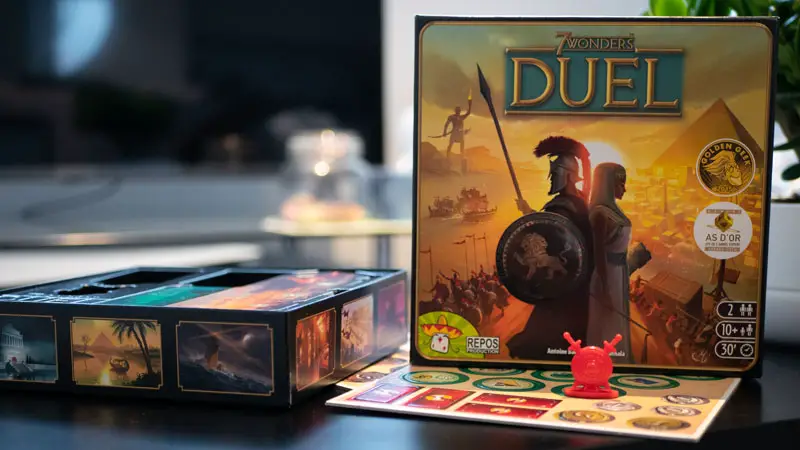
7 Wonders Duel is a card drafting board game with a pinch of resource management, that uses some of the main mechanics of its older brother and it perfects them, becoming, in my opinion, one of the best two-player board games and my personal favourite.
7 Wonders Duel is a card drafting board game that blends elements of resource management, civilization building, and tactical decision-making.
The 2 players compete to construct the greatest civilization over a time of 3 Ages, by acquiring resources, developing military power, and constructing architectural wonders.
Game info
Designer: Antoine Bauza, Bruno Cathala
Players: 2 players
Play Time: 30 minutes
Age: 10+
Game Components
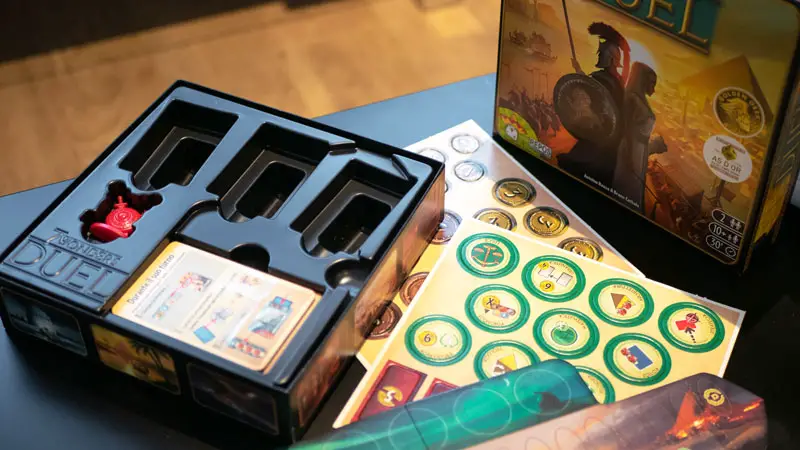
The game box is a sturdy 20x20cm box, perfect to fit anywhere if you want to play the game while travelling.
Each element of the game can be easily stored in the box thanks to its clever design.
I like when you finish playing a game, store it away and the components don’t travel around so you don’t have to clear the mess every time you want to play that game again.
I didn’t sleeve my cards (yet), so my opinion written above might change if the cards no longer fit the inserts after being sleeved.
Let’s open the box though, what’s inside is far more important!
Guild and Age cards
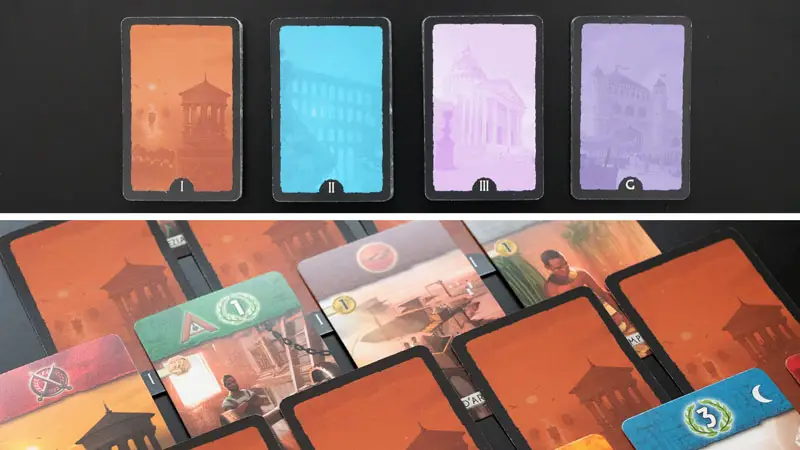
These cards are the core of the game and they represent buildings, which give bonuses to your civilization once built.
There are 7 different types of buildings, each one with a unique coloured border:
- Raw materials (brown cards): produce resources such as wood, stone and clay;
- Manufactured goods (grey cards): produce resources such as glass and papyrus;
- Civilian Buildings (blue cards): they are worth victory points;
- Scientific Buildings (green cards): these allow you to score victory points and acquire a scientific symbol;
- Commercial Buildings (yellow cards): these buildings are worth coins, produce resources, change the trading rules, and are sometimes worth victory points;
- Military Buildings (red cards): increase your military power by giving you Shields;
- Guilds (purple cards): they allow you to score points based on specific criteria.
Board and Conflict Pawn
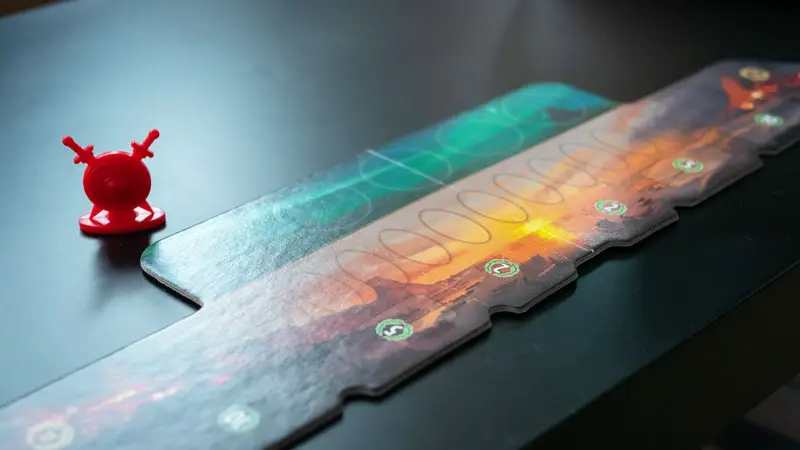
The board tracks the Military Rivalry between your city and the opponent’s and stores the Science & Progress tokens.
The Conflict Pawn indicates a player city’s military advantage over the other; it’s placed in the middle of the board at the beginning of the game and it moves towards your capital or the opponent’s one based on the military cards played in each round.
I’ll better explain the purpose of these two components later on in the article.
Progress and Military Tokens
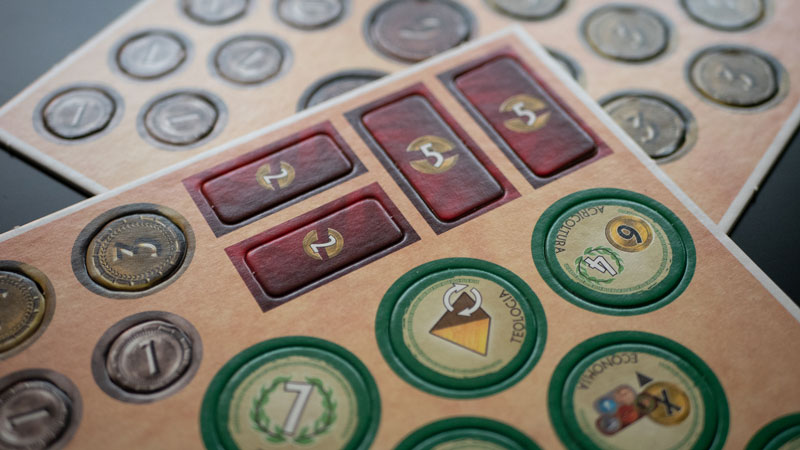
The green Progress Tokens represent the bonus effect that your city earns by collecting identical pairs of scientific symbols.
The red Military Tokens represent the benefits of conquering the opponent’s military spaces on the board.
Coins
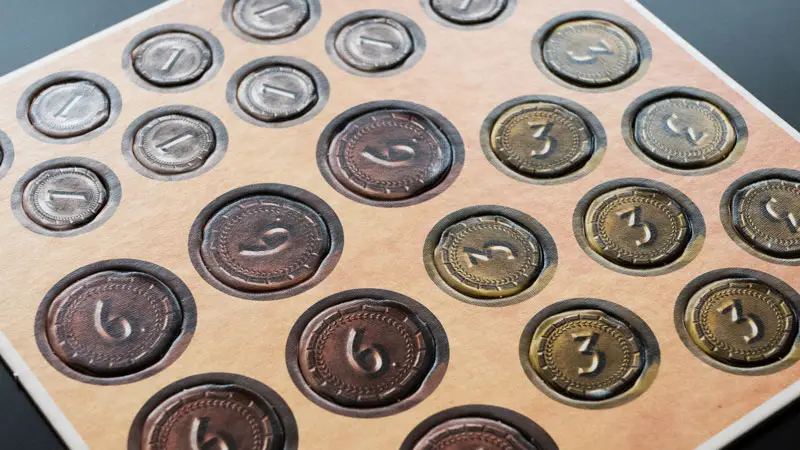
Coins are used to purchase resources and construct buildings.
At the end of the game, the remaining coins will be considered as Victory Points, hence don’t use them just for the sake of it.
Wonder Cards
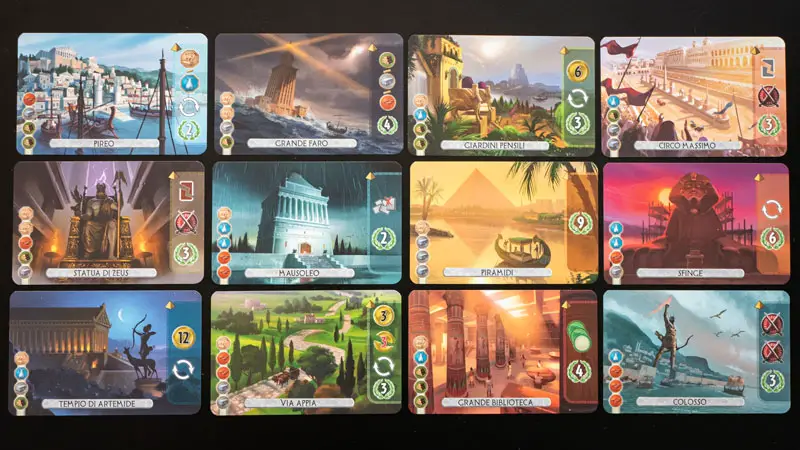
These 12 amazingly drawn cards represent famous Wonders from the past, such as the Pyramids or the Colossus, and they all have a unique bonus effect that helps your Civilization progress.
Scorebook and Helpsheet
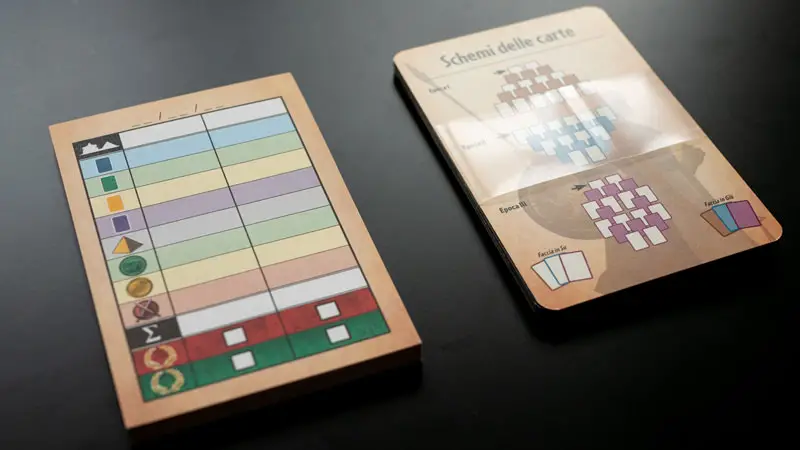
The Scorebook is used to count the points at the end of the game.
Needless to say, I have never used it. I’d rather use a piece of paper so it doesn’t get ruined as I have a big problem when it comes to making permanent changes on game components.
The helpsheet is a double-face card that helps you remember what you can do on your turn and how to set up the card board at the beginning of each Era.
How to play 7 Wonders Duel
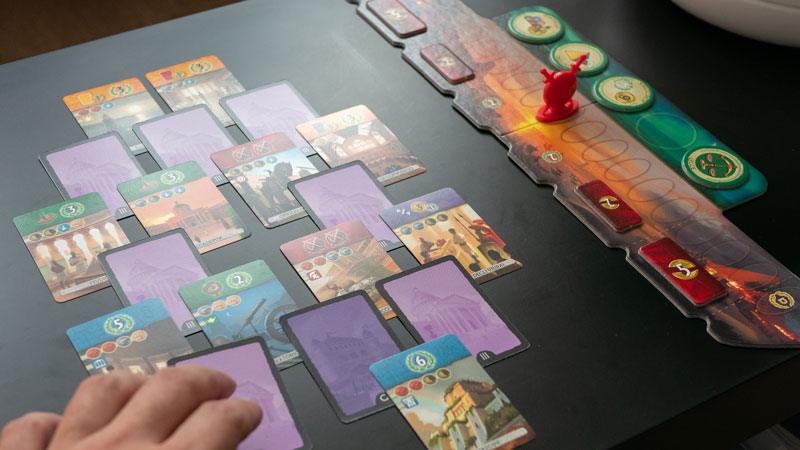
The beginning of the game starts with quick preparation of the board, coins, Wonders and the cards of the 1st Age.
The board must be placed between the players, on one side of the play area, with the Conflict Token in the neutral zone in the middle of the board as shown in the above picture.
On the same board, you also have to place 5 Progress Tokens (face up) randomly chosen.
Each player then takes 7 coins and 4 Wonder cards. Players take turns to select 4 Wonders each.
Then is the turn to prepare the cards. A game begins in Age I and finishes with Age III (unless a military or scientific win).
At the beginning of each Age, after shuffling the corresponding deck, cards are displayed between the players following the structure of the current Age.
Some cards are displayed face up, while others are face down.
The picture below shows how to display the cards on the table.
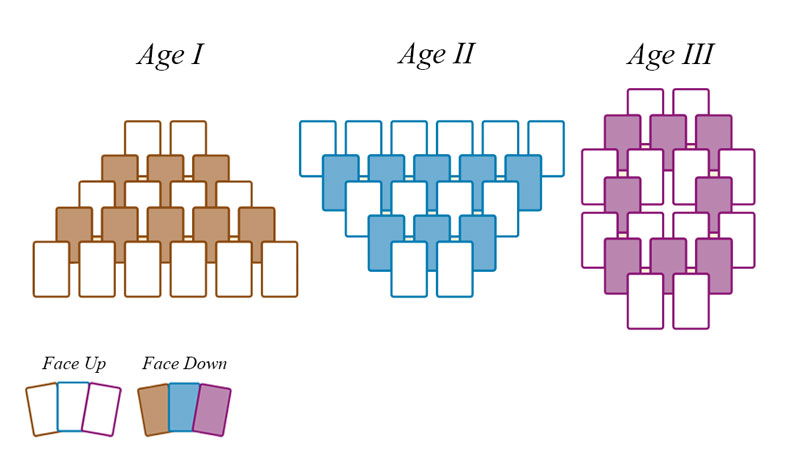
Then, each player chooses one of the “accessible” cards and takes it.
The accessible cards are the ones which aren’t partially covered by any others; therefore on your first turn, you can only choose the cards in the first row that aren’t covered by other cards.
There are 3 actions you can do after taking a card:
- Construct the Building;
- Discard the card to get coins;
- Construct a Wonder
Construct the Building
To construct a building, you have to pay the cost of it, which can be either coins or resources; the cost of constructing a building is shown right below the coloured label.
If you have the requested cost, you can place the building in front of you and that building now belongs to your city.
Discard the card to get coins
You can discard the chosen card to get 2 coins + 1 coin per yellow card built in your city.
The discarded cards are placed face-down next to the board and can be consulted at any time by players.
Construct a Wonder
You can pay the cost of the Wonder and place the card you picked from the board face down partially covered by the Wonder card (the card you picked doesn’t have any effect nor gives you any bonus).
From now on the Wonder is built and it’ll give you the related bonus, such as Victory Points, Shields, Resources and so on.
Out of the 8 Wonders, only 7 may be built throughout the game.
As soon as the 7th Wonder is built, the remaining one will be returned to the box.
Once you have picked all the cards from the board, that current Age is considered finished and you can then prepare the next Age’s structure.
This is in short how to play 7 Wonders Duel, rinse and repeat over the course of the 3 Ages and you’re set!
How to win 7 Wonders Duel?
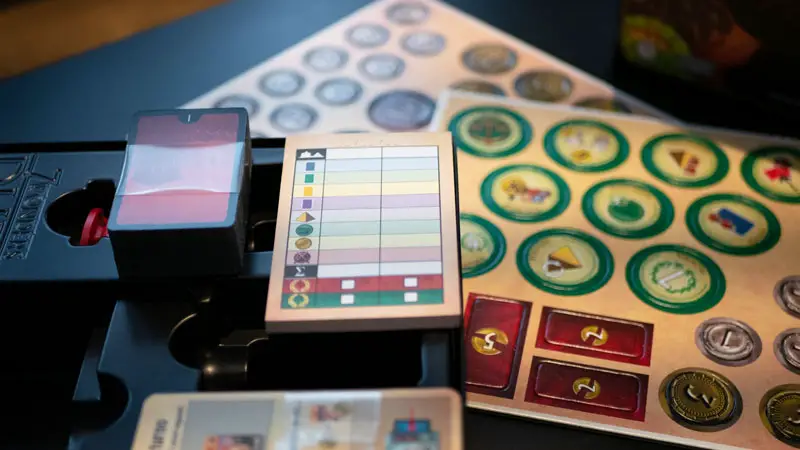
There are 3 different ways of winning the game: Military or Scientific Supremacy, and Civilian Victory.
While the first two can be achieved at any time during the game, the Civilian Victory only happens at the end of the game after counting all the victory points accumulated by the players.
Military Supremacy
This is one of the winning conditions that can happen at any point during the game.
Every time you pick a Military Card (or Wonders, like the Colossus) look at the number of shields on it; each one of them allows you to move the Conflict Pawn one space towards the opponent city’s capital.
The board is going to be like a tug-of-war, with the Conflict Pawn moving back and forth between you and the other player.
If the Conflict Pawn reaches the opposing capital, you immediately win the game!
Scientific Supremacy
The second way of winning before the game ends is via scientific supremacy.
There are 7 different symbols in the game and they are drawn on the Scientific Cards; if you gather 6 different symbols, you immediately win the game!
Civilian Victory
The last way of winning is by Civilian Victory.
If no player has won through either Military or Scientific Supremacy before the end of the Age III, the player with the higher number of Victory Points (VP) wins the game.
To determine your total VP you have to add:
- Military victory points, depending on the position of the Conflict pawn;
- Victory points from your Buildings (blue, green, yellow, and purple cards);
- Victory points from your Wonders;
- Victory points from Progress Tokens;
- Your city’s treasury: each complete set of 3 coins is worth 1 point.
In the case Victory Points are the same, the player who has the most Victory Points from their Civilian buildings wins the game.
If it’s still a tie, players share their victory (never happened to me yet!).
Conclusion
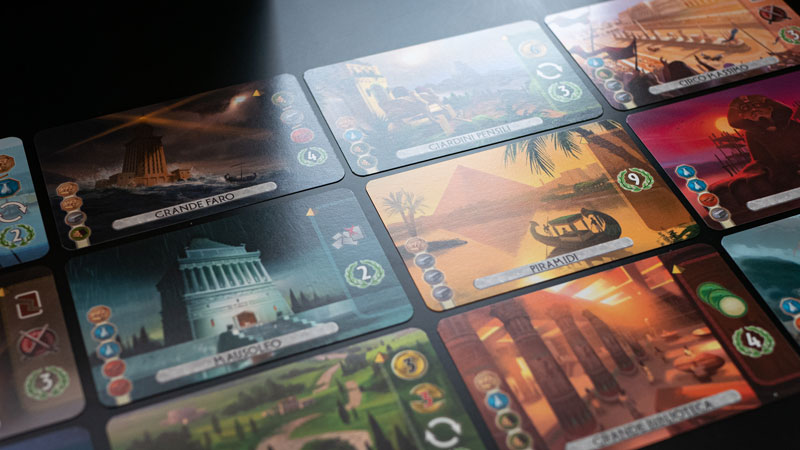
In short:
I truly believe this game is a must-have in everyone’s board games collection.
Read on to find a more detailed explanation of why I wrote this statement.
Fun
As you could have guessed by reading the title, I love 7 Wonders Duel.
I love it for many reasons and one of them is because it makes me want to play again and again. And why’s that? Because the game is fun.
That’s the primary reason why I play board games in my spare time; I want to get my mind distracted by doing something that makes me happy and if a game isn’t fun why even bother to play it?
The game becomes even more fun depending on who’s your opponent.
I believe 7 Wonders Duel truly shines when you have a competitive partner to play with, as this little gem is nowhere near an easy and relaxing experience.
It’s a ruthless game that leaves no room for chivalry. Be careful whom you’re playing against, your feelings could get hurt.
Components Quality
The quality of components could be better, especially cards. They are quite thin and after just a few games you can already see the infamous signs of use.
I’d recommend getting card sleeves, although I didn’t do it either. I’m lazy.
Replayability
I think 7 Wonders Duel scores high on replayability. Even though the pool of cards isn’t that huge, the fact the position of the cards always changes in each game makes it new every time you play it.
I have played dozens of times and I’m still not sold on getting any expansions, although I’ve heard really good things about the two expansions Pantheon and Agora, so I might get them at some point anyway.
Players Interaction
In 7 Wonders Duel, players have the opportunity to engage in a variety of interactions that will shape the outcome of the game.
The key aspect of the player interaction is the drafting of cards from the central Age display; players must carefully consider which cards to take, as their choices not only impact their own civilization but also limit the options available to their opponent.
This mechanic creates dynamic and competitive rounds where players strive to outflank each other and secure the most advantageous cards.
Nothing beats the satisfaction of denying your opponent access to that resource they’ve been chasing since turn 1.
Difficulty
7 Wonders Duel offers a moderate level of complexity, providing an engaging and strategic experience without being overly difficult.
The game mechanics are smartly designed, allowing players to grasp the rules relatively quickly. Despite the presence of strategic and decision-making elements, the game is accessible to both experienced and novice players.
The rulebook is well-structured and provides clear explanations, making it easier for players to understand and enjoy the game.
One thing I keep coming back to is the mechanic for buying resources that you don’t produce. I find it too difficult to keep in mind when it has been a while since I last played.
- STRATEGY GAME: Experience an intense two-player struggle for supremacy in the ancient world! Challenge your opponent and bring your civilization to victory with Prestigious Buildings, Military Supremacy or Scientific Supremacy.
- TAKE CONTROL OF YOUR CIVILIZATION: Decide to invest in science, military or prestige. Will your city achieve greatness, or will your opponent prevent you from completing all your Wonders?
- VICTORY CAN BE ACHIEVE IN THREE WAYS: Invade your opponent’s capital, achieve a monopoly on scientific advancement, or craft the city that will earn the most victory points in the end. But be warned: only seven of the eight Wonders in play can be built.
As an Amazon Associate I earn from qualifying purchases, at no additional cost to you. See our Affiliate Disclosure
